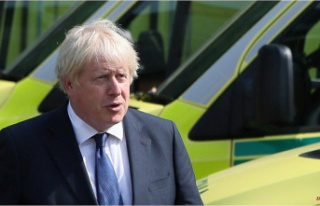Boris Johnson survived an attempt by his MPs to remove him from office as leader of the Conservative Party and prime minister in confidence vote. However, he is still being resisted by his own MPs. What is the next step for Johnson loyalists and Tory rebels?
Boris Johnson used his power to make his party feel good. Anybody who has seen Boris Johnson work with the crowd at a Conservative Party Conference will know the impact he has had on activists.
However, this feel-good factor was difficult to find among Tory MPs in parliament this morning.
Yes, Monday night's confidence vote was won by the prime minister.
However, any hope that his party would move forward was destroyed by the outcome - and the fact that 41% of those who voted for Boris Johnson out.
On Monday morning, a MP arrived at Parliament and lamented that it was not good.
The rebellion was larger than expected, and this exposes a divided party.
One prominent rebel stated that the cabinet should tell him to leave but they won't, because they are too weak. He kept them weak.
What happens next?
The prime minister can be protected from another confidence vote for one year.
The current rules of 1922 committee that organises leadership contests prohibit another challenge for 12 months following the winner.
However, not everyone is convinced.
One backbencher said to me this morning, "All this assumption he's safe for one year - I don’t think anyone believes this."
The committee considered amending the rules of Theresa May’s premiership to allow for a second confidence, a few months after she had won a first.
Already, rebels are discussing how they might force Boris Johnson to vote again.
Senior critic of the PM says that Sir Graham Brady, chairman of the [1922 committee], will feel enormous pressure to alter the rules.
Changes to the process are not certain. Sources on the committee mentioned that they needed a period to calm down.
However, there are also big political pitfalls that could lead to people changing their minds.
The two by-elections that will take place later in the month are the topic currently dominating discussion among Tory MPs.
The Conservatives will defend Wakefield in West Yorkshire and Tiverton, Honiton, in Devon on 23 June. Labour is aiming to retake Wakefield, one the "Red Wall” northern strongholds they lost in Boris Johnson’s 2019 landslide.
In the hopes of regaining the Tory heartland seats, the Lib Dems will throw everything at Tiverton & Honiton where the Tories hold a 24,000 majority.
Senior Tories are worried that they will lose both elections - putting Boris Johnson's leadership in a new crisis.
According to a senior rebel I spoke with this morning, his main focus is now to influence enough Tory MPs so that the balance of power shifts away from the prime minster.
They believe that if they can convince 30 MPs to vote for Mr Johnson's switch, they will be able bring him down.
Some argue that by-election evidence that the prime minister is now a liability at poll box will aid that persuasion process.
Another rebel said to me that if they are "caned" in both contests it will cause more concern within the parliamentary party.
This is not the case everywhere.
Some of the PM's critics want to move on now and say that they won't be changing their minds after the mid-term elections.
Nigel Mills, Tory MP, told BBC: "We had an election yesterday, and we made a decision."
But the key point is that many MPs don't believe the party can go on, and are looking for the next crisis.
Partygate is another example of Partygate, which isn’t over yet.
The privileges committee of Parliament is expected to investigate whether the prime minister misled House of Commons. Sources close to the process believe that this could prove to be a damning report for Mr Johnson. It is expected that the committee will report in the autumn.
It could be that more MPs will agree to a new leader if it concludes that he intentionally misled parliament. It could also provide new evidence about what happened in Downing Street during lockdown, which could prove to be harmful.
According to one source, an opposition source said to me that "we might have to wait until the committee brings him down...this just going to rumble."
The PM also has to answer a larger question about his authority. He will have to be careful about what he does with contentious votes or controversial policies, despite his large majority.
Is it harder to win the hearts of those who want him out?
In the coming weeks, there will be pressure on the prime minister to alter the way he governs.
An ex-cabinet minister said to me that the PM should "cut the culture war crap".
Can he change things?
They said that he could do it, but that he didn't have the time.
Another senior backbencher stated that the prime minister should be more conservative in his policies. For many, this means tax cuts. Some call for a reshuffle to allow different voices to be heard at the cabinet table.
There are many people who want to see change within government.
I was told by a minister that we have a window to show us how it is done... Things need to change most importantly for him.
This person is not optimistic. "They are still in bunker mode, telling people get in line."
Although the prime minister deemed Monday night's results decisive, there are not many in his party who would say it privately today.
One MP said: "Keir Sternmer could have chosen the result. The prime minister will believe he has enough to continue. The rebels will think 'one last breath'.
The Conservative Party is still divided. The leadership debate continues.












